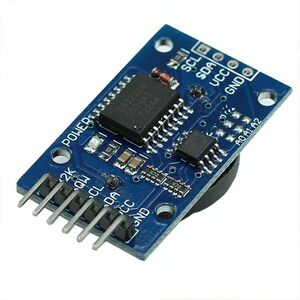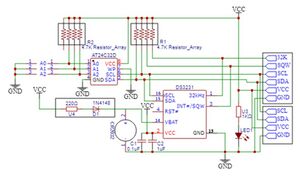DS3231 RTC Module: Difference between revisions
Jump to navigation
Jump to search
m (JMerkle moved page DS3231 RTC to DS3231 RTC Module) |
No edit summary |
||
| (4 intermediate revisions by the same user not shown) | |||
| Line 1: | Line 1: | ||
The DS3231 RTC is a low cost, battery backup, Real Time Clock, that connects to an I2C bus, providing accurate time information. | The DS3231 RTC is a low cost, battery backup, Real Time Clock, that connects to an I2C bus, providing accurate time information. | ||
[[File:DS3231.jpg|right|thumb]] | [[File:DS3231.jpg|right|thumb]] | ||
[[File:DS3231 Module Schematic.jpg|right|thumb]] | |||
Many DS3231 modules, like this one, https://www.ebay.com/itm/314250880191, have two I2C devices on-board, | Many DS3231 modules, like this one, https://www.ebay.com/itm/314250880191, have two I2C devices on-board, | ||
a DS3231 RTC and a AT24C32 EEPROM, allowing the storage of information into non-volatile memory. | a DS3231 RTC and a AT24C32 EEPROM, allowing the storage of information into non-volatile memory. | ||
| Line 19: | Line 20: | ||
defeating the charging circuit. This method allows the circuit to be restored easily in the future. | defeating the charging circuit. This method allows the circuit to be restored easily in the future. | ||
==DS3231M== | ==DS3231, DS3231SN, DS3231M== | ||
A variant of the | A variant of the DS3231/DS3231SN chip is the DS3231M | ||
The "M" variant using a MEMS oscillator which is less accurate (around 5ppm) | |||
compared to the standard "SN" version that uses a crystal oscillator, | |||
providing higher precision (around 2ppm). The "M" is more resistant to shock and vibration. | |||
The "M" variant only produces a 1Hz output frequency on the INT/SQW pin. | |||
Although the frequency output can be enabled/disabled, the frequency is fixed at 1Hz. | |||
==Notes / Other Links== | ==Notes / Other Links== | ||
https://thecavepearlproject.org/2014/05/21/using-a-cheap-3-ds3231-rtc-at24c32-eeprom-from-ebay/ | https://thecavepearlproject.org/2014/05/21/using-a-cheap-3-ds3231-rtc-at24c32-eeprom-from-ebay/ | ||
https://forum.arduino.cc/t/ds3231-and-sqw-unable-to-change-output-frequency-beyond-1hz/479262/10 | |||
'''Example DS3231 and AT24C32 source code:''' | |||
https://github.com/JimMerkle/Arduino_Uno_Command_Line_I2C_DS3231_TM1637 | |||
Latest revision as of 16:33, 27 January 2025
The DS3231 RTC is a low cost, battery backup, Real Time Clock, that connects to an I2C bus, providing accurate time information.


Many DS3231 modules, like this one, https://www.ebay.com/itm/314250880191, have two I2C devices on-board, a DS3231 RTC and a AT24C32 EEPROM, allowing the storage of information into non-volatile memory.
Documents
DS3231: https://www.analog.com/media/en/technical-documentation/data-sheets/ds3231.pdf The time (and temperature), are accessed via 19 byte-wide registers, see Address Map on page 11. AT24C32: https://ww1.microchip.com/downloads/en/devicedoc/doc0336.pdf This 32Kbit EEPROM (4096 x 8), will hold 4096 bytes of data.
Charging Circuit
These modules typically have a battery charging circuit to recharge a LIR2032, lithium coin cell. This can cause a problem if using CR2032, a cheaper non-rechargable coin cell. This page describes the problem: https://forum.arduino.cc/t/ds3231-cr2032-vs-lir2032-warning-is-your-module-killing-the-battery/557346 My preferred fix is to desolder the diode (or resistor), and lift one end from the board, thus defeating the charging circuit. This method allows the circuit to be restored easily in the future.
DS3231, DS3231SN, DS3231M
A variant of the DS3231/DS3231SN chip is the DS3231M The "M" variant using a MEMS oscillator which is less accurate (around 5ppm) compared to the standard "SN" version that uses a crystal oscillator, providing higher precision (around 2ppm). The "M" is more resistant to shock and vibration. The "M" variant only produces a 1Hz output frequency on the INT/SQW pin. Although the frequency output can be enabled/disabled, the frequency is fixed at 1Hz.
Notes / Other Links
https://thecavepearlproject.org/2014/05/21/using-a-cheap-3-ds3231-rtc-at24c32-eeprom-from-ebay/ https://forum.arduino.cc/t/ds3231-and-sqw-unable-to-change-output-frequency-beyond-1hz/479262/10 Example DS3231 and AT24C32 source code: https://github.com/JimMerkle/Arduino_Uno_Command_Line_I2C_DS3231_TM1637